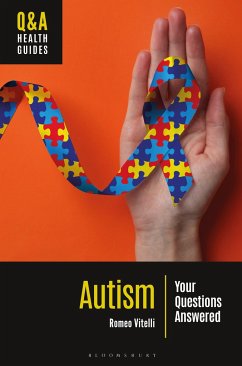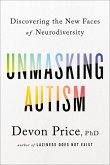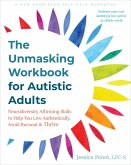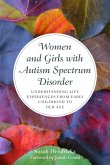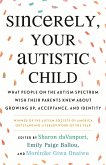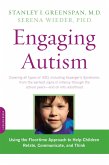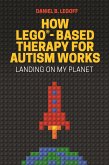- Gebundenes Buch
- Merkliste
- Auf die Merkliste
- Bewerten Bewerten
- Teilen
- Produkt teilen
- Produkterinnerung
- Produkterinnerung
"Research suggests that about 1% of the world's population is on the autism spectrum. Discover the answers to common questions about living with neurodiversity"--
Andere Kunden interessierten sich auch für
![Unmasking Autism Unmasking Autism]() PhD Devon PriceUnmasking Autism23,99 €
PhD Devon PriceUnmasking Autism23,99 €![ADHD ADHD]() Sarah Boslaugh (USA Independent researcher)ADHD61,99 €
Sarah Boslaugh (USA Independent researcher)ADHD61,99 €![The Unmasking Workbook for Autistic Adults The Unmasking Workbook for Autistic Adults]() Jessica PenotThe Unmasking Workbook for Autistic Adults23,99 €
Jessica PenotThe Unmasking Workbook for Autistic Adults23,99 €![Women and Girls with Autism Spectrum Disorder Women and Girls with Autism Spectrum Disorder]() Sarah HendrickxWomen and Girls with Autism Spectrum Disorder28,99 €
Sarah HendrickxWomen and Girls with Autism Spectrum Disorder28,99 €![Sincerely, Your Autistic Child Sincerely, Your Autistic Child]() Emily Paige BallouSincerely, Your Autistic Child15,99 €
Emily Paige BallouSincerely, Your Autistic Child15,99 €![Engaging Autism Engaging Autism]() Serena WiederEngaging Autism23,99 €
Serena WiederEngaging Autism23,99 €![How Lego(r)-Based Therapy for Autism Works How Lego(r)-Based Therapy for Autism Works]() Daniel B. LeGoffHow Lego(r)-Based Therapy for Autism Works35,99 €
Daniel B. LeGoffHow Lego(r)-Based Therapy for Autism Works35,99 €-
-
-
"Research suggests that about 1% of the world's population is on the autism spectrum. Discover the answers to common questions about living with neurodiversity"--
Hinweis: Dieser Artikel kann nur an eine deutsche Lieferadresse ausgeliefert werden.
Hinweis: Dieser Artikel kann nur an eine deutsche Lieferadresse ausgeliefert werden.
Produktdetails
- Produktdetails
- Q&A Health Guides
- Verlag: Bloomsbury Publishing PLC
- Seitenzahl: 136
- Erscheinungstermin: 2. Mai 2024
- Englisch
- Abmessung: 241mm x 159mm x 13mm
- Gewicht: 358g
- ISBN-13: 9781440881565
- ISBN-10: 1440881561
- Artikelnr.: 69790750
- Herstellerkennzeichnung
- Libri GmbH
- Europaallee 1
- 36244 Bad Hersfeld
- gpsr@libri.de
- Q&A Health Guides
- Verlag: Bloomsbury Publishing PLC
- Seitenzahl: 136
- Erscheinungstermin: 2. Mai 2024
- Englisch
- Abmessung: 241mm x 159mm x 13mm
- Gewicht: 358g
- ISBN-13: 9781440881565
- ISBN-10: 1440881561
- Artikelnr.: 69790750
- Herstellerkennzeichnung
- Libri GmbH
- Europaallee 1
- 36244 Bad Hersfeld
- gpsr@libri.de
Romeo Vitelli received his doctorate in psychology from York University in Toronto, Ontario, in 1987 and has been in private practice since 2003. His published works with ABC-CLIO include What You Need to Know about Schizophrenia (2021), Depression: Your Questions Answered (2019), Self-Injury: Your Questions Answered (2018), and Substance Abuse: Your Questions Answered (2018).
Series Foreword
Introduction
Guide to Health Literacy
Common Misconceptions about Autism
1. Autism is a mental illness or disease
2. Autism is caused by bad parenting
3. Vaccines cause autism
4. Autistic people are unable to communicate or form relationships
5. Autistic people lack empathy
Questions and Answers
The Basics
1. What is autism?
2. What are the primary symptoms or characteristics of autism?
3. What exactly is the autism spectrum? Why are there different types or
degrees of autism?
4. What is Asperger's syndrome?
5. What is neurodiversity, and how has this concept impacted conversations
around autism?
6. How common is autism, and are autism diagnoses on the rise?
7. Are certain people more likely to be diagnosed with autism?
8. Are there any famous autistic individuals?
9. What is the autism rights movement?
Autism Causes
10. What role does genetics play in autism?
11. Which factors during pregnancy and birth might be linked to autism?
12. Is autism caused by vaccines?
13. Is there a connection between autoimmune disease and autism?
14. Is autism caused by bad parenting?
15. Can autism be prevented?
Features of Autism
16. Are the brains of people with autism "wired differently"?
17. How does autism affect language development and communication?
18. How does autism affect an individual's social skills and ability to
form interpersonal relationships?
19. How does autism affect a person's emotions?
20. How does autism affect a person's ability to learn?
21. How do sensory issues impact individuals with autism?
22. How does autism impact cognitive development?
23. Why do people with autism often struggle with changes in their routine?
24. Why do people with autism often have very strong but narrow interests?
25. Why do people with autism often engage in repetitive behaviors?
26. Why do some people with autism self-harm?
27. Does having autism give individuals special abilities in other areas?
Diagnosing and Managing Autism
28. How is autism diagnosed?
29. Why is it important to diagnose autism early?
30. What other conditions tend to occur alongside autism?
31. Can autism be cured?
32. What medications can be used to manage autism?
33. What non-drug therapies and interventions can help individuals with
autism?
34. Can alternative medicine help those with autism?
35. What types of assistive technology are available for individuals with
autism?
Living with Autism
36. How does autism affect a person's daily life?
37. Can people with autism live independently?
38. How can parents and caregivers support autistic children at home?
39. What is the impact of autism on family members and caregivers?
40. Can people with autism form meaningful relationships?
41. What's the best way to communicate with and support a friend or partner
with autism?
42. What is an IEP, and how can it help autistic students?
43. How can teachers and school staff support students with autism in the
classroom?
44. What are the challenges faced by adults with autism in the workplace?
Can individuals with autism have successful careers?
45. How can employers create an autism-friendly work environment?
46. How does social media impact individuals with autism?
47. How can the media and society as a whole become more inclusive of
individuals with autism?
Case Studies
1. Emily's Personalized Treatment Plan
2. James's Experience at a Residential Care Facility
3. How Lily's Autism Affects Her Family
4. Max is Diagnosed with Autism as an Adult
5. Jake has Undiagnosed Asperger's
Glossary
Directory of Resources
Index
Introduction
Guide to Health Literacy
Common Misconceptions about Autism
1. Autism is a mental illness or disease
2. Autism is caused by bad parenting
3. Vaccines cause autism
4. Autistic people are unable to communicate or form relationships
5. Autistic people lack empathy
Questions and Answers
The Basics
1. What is autism?
2. What are the primary symptoms or characteristics of autism?
3. What exactly is the autism spectrum? Why are there different types or
degrees of autism?
4. What is Asperger's syndrome?
5. What is neurodiversity, and how has this concept impacted conversations
around autism?
6. How common is autism, and are autism diagnoses on the rise?
7. Are certain people more likely to be diagnosed with autism?
8. Are there any famous autistic individuals?
9. What is the autism rights movement?
Autism Causes
10. What role does genetics play in autism?
11. Which factors during pregnancy and birth might be linked to autism?
12. Is autism caused by vaccines?
13. Is there a connection between autoimmune disease and autism?
14. Is autism caused by bad parenting?
15. Can autism be prevented?
Features of Autism
16. Are the brains of people with autism "wired differently"?
17. How does autism affect language development and communication?
18. How does autism affect an individual's social skills and ability to
form interpersonal relationships?
19. How does autism affect a person's emotions?
20. How does autism affect a person's ability to learn?
21. How do sensory issues impact individuals with autism?
22. How does autism impact cognitive development?
23. Why do people with autism often struggle with changes in their routine?
24. Why do people with autism often have very strong but narrow interests?
25. Why do people with autism often engage in repetitive behaviors?
26. Why do some people with autism self-harm?
27. Does having autism give individuals special abilities in other areas?
Diagnosing and Managing Autism
28. How is autism diagnosed?
29. Why is it important to diagnose autism early?
30. What other conditions tend to occur alongside autism?
31. Can autism be cured?
32. What medications can be used to manage autism?
33. What non-drug therapies and interventions can help individuals with
autism?
34. Can alternative medicine help those with autism?
35. What types of assistive technology are available for individuals with
autism?
Living with Autism
36. How does autism affect a person's daily life?
37. Can people with autism live independently?
38. How can parents and caregivers support autistic children at home?
39. What is the impact of autism on family members and caregivers?
40. Can people with autism form meaningful relationships?
41. What's the best way to communicate with and support a friend or partner
with autism?
42. What is an IEP, and how can it help autistic students?
43. How can teachers and school staff support students with autism in the
classroom?
44. What are the challenges faced by adults with autism in the workplace?
Can individuals with autism have successful careers?
45. How can employers create an autism-friendly work environment?
46. How does social media impact individuals with autism?
47. How can the media and society as a whole become more inclusive of
individuals with autism?
Case Studies
1. Emily's Personalized Treatment Plan
2. James's Experience at a Residential Care Facility
3. How Lily's Autism Affects Her Family
4. Max is Diagnosed with Autism as an Adult
5. Jake has Undiagnosed Asperger's
Glossary
Directory of Resources
Index
Series Foreword
Introduction
Guide to Health Literacy
Common Misconceptions about Autism
1. Autism is a mental illness or disease
2. Autism is caused by bad parenting
3. Vaccines cause autism
4. Autistic people are unable to communicate or form relationships
5. Autistic people lack empathy
Questions and Answers
The Basics
1. What is autism?
2. What are the primary symptoms or characteristics of autism?
3. What exactly is the autism spectrum? Why are there different types or
degrees of autism?
4. What is Asperger's syndrome?
5. What is neurodiversity, and how has this concept impacted conversations
around autism?
6. How common is autism, and are autism diagnoses on the rise?
7. Are certain people more likely to be diagnosed with autism?
8. Are there any famous autistic individuals?
9. What is the autism rights movement?
Autism Causes
10. What role does genetics play in autism?
11. Which factors during pregnancy and birth might be linked to autism?
12. Is autism caused by vaccines?
13. Is there a connection between autoimmune disease and autism?
14. Is autism caused by bad parenting?
15. Can autism be prevented?
Features of Autism
16. Are the brains of people with autism "wired differently"?
17. How does autism affect language development and communication?
18. How does autism affect an individual's social skills and ability to
form interpersonal relationships?
19. How does autism affect a person's emotions?
20. How does autism affect a person's ability to learn?
21. How do sensory issues impact individuals with autism?
22. How does autism impact cognitive development?
23. Why do people with autism often struggle with changes in their routine?
24. Why do people with autism often have very strong but narrow interests?
25. Why do people with autism often engage in repetitive behaviors?
26. Why do some people with autism self-harm?
27. Does having autism give individuals special abilities in other areas?
Diagnosing and Managing Autism
28. How is autism diagnosed?
29. Why is it important to diagnose autism early?
30. What other conditions tend to occur alongside autism?
31. Can autism be cured?
32. What medications can be used to manage autism?
33. What non-drug therapies and interventions can help individuals with
autism?
34. Can alternative medicine help those with autism?
35. What types of assistive technology are available for individuals with
autism?
Living with Autism
36. How does autism affect a person's daily life?
37. Can people with autism live independently?
38. How can parents and caregivers support autistic children at home?
39. What is the impact of autism on family members and caregivers?
40. Can people with autism form meaningful relationships?
41. What's the best way to communicate with and support a friend or partner
with autism?
42. What is an IEP, and how can it help autistic students?
43. How can teachers and school staff support students with autism in the
classroom?
44. What are the challenges faced by adults with autism in the workplace?
Can individuals with autism have successful careers?
45. How can employers create an autism-friendly work environment?
46. How does social media impact individuals with autism?
47. How can the media and society as a whole become more inclusive of
individuals with autism?
Case Studies
1. Emily's Personalized Treatment Plan
2. James's Experience at a Residential Care Facility
3. How Lily's Autism Affects Her Family
4. Max is Diagnosed with Autism as an Adult
5. Jake has Undiagnosed Asperger's
Glossary
Directory of Resources
Index
Introduction
Guide to Health Literacy
Common Misconceptions about Autism
1. Autism is a mental illness or disease
2. Autism is caused by bad parenting
3. Vaccines cause autism
4. Autistic people are unable to communicate or form relationships
5. Autistic people lack empathy
Questions and Answers
The Basics
1. What is autism?
2. What are the primary symptoms or characteristics of autism?
3. What exactly is the autism spectrum? Why are there different types or
degrees of autism?
4. What is Asperger's syndrome?
5. What is neurodiversity, and how has this concept impacted conversations
around autism?
6. How common is autism, and are autism diagnoses on the rise?
7. Are certain people more likely to be diagnosed with autism?
8. Are there any famous autistic individuals?
9. What is the autism rights movement?
Autism Causes
10. What role does genetics play in autism?
11. Which factors during pregnancy and birth might be linked to autism?
12. Is autism caused by vaccines?
13. Is there a connection between autoimmune disease and autism?
14. Is autism caused by bad parenting?
15. Can autism be prevented?
Features of Autism
16. Are the brains of people with autism "wired differently"?
17. How does autism affect language development and communication?
18. How does autism affect an individual's social skills and ability to
form interpersonal relationships?
19. How does autism affect a person's emotions?
20. How does autism affect a person's ability to learn?
21. How do sensory issues impact individuals with autism?
22. How does autism impact cognitive development?
23. Why do people with autism often struggle with changes in their routine?
24. Why do people with autism often have very strong but narrow interests?
25. Why do people with autism often engage in repetitive behaviors?
26. Why do some people with autism self-harm?
27. Does having autism give individuals special abilities in other areas?
Diagnosing and Managing Autism
28. How is autism diagnosed?
29. Why is it important to diagnose autism early?
30. What other conditions tend to occur alongside autism?
31. Can autism be cured?
32. What medications can be used to manage autism?
33. What non-drug therapies and interventions can help individuals with
autism?
34. Can alternative medicine help those with autism?
35. What types of assistive technology are available for individuals with
autism?
Living with Autism
36. How does autism affect a person's daily life?
37. Can people with autism live independently?
38. How can parents and caregivers support autistic children at home?
39. What is the impact of autism on family members and caregivers?
40. Can people with autism form meaningful relationships?
41. What's the best way to communicate with and support a friend or partner
with autism?
42. What is an IEP, and how can it help autistic students?
43. How can teachers and school staff support students with autism in the
classroom?
44. What are the challenges faced by adults with autism in the workplace?
Can individuals with autism have successful careers?
45. How can employers create an autism-friendly work environment?
46. How does social media impact individuals with autism?
47. How can the media and society as a whole become more inclusive of
individuals with autism?
Case Studies
1. Emily's Personalized Treatment Plan
2. James's Experience at a Residential Care Facility
3. How Lily's Autism Affects Her Family
4. Max is Diagnosed with Autism as an Adult
5. Jake has Undiagnosed Asperger's
Glossary
Directory of Resources
Index

